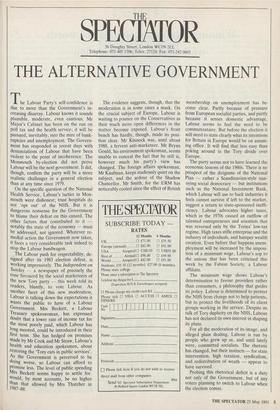56 Doughty Street, London WCIN 2LI, Telephone: 071-405 1706; Telex:
27124; Fax: 071-242 0603
THE ALTERNATIVE GOVERNMENT
On the specific question of the National Health Service, Labour's tactics in Mon- mouth were dishonest; trust hospitals do not 'opt out' of the NHS. But it is dangerous nonsense for the Government to blame their defeat on this canard. The other factors that contributed to it notably the state of the economy — must be addressed, not ignored. Whatever re- medial action the Government now takes, it faces a very considerable task indeed to stop the Labour bandwagon.
The Labour push for respectability, de- signed after its 1983 election defeat, is working impressively. The Independent on Sunday --- a newspaper of precisely the tone favoured by the social marketeers of the new Tory party -- this week told its readers, bluntly, to vote Labour. As another facet of this new moderation, Labour is talking down the expectations it wants the public to have of a Labour Government. Mrs Beckett, a Labour Treasury spokeswoman, has expressed doubt that a lower rate of income tax for the most poorly paid, which Labour has long mooted, could be introduced in their first term. She has hedged on promises made by Mr Cook and Mr Straw, Labour's health and education spokesmen, about restoring the 'Tory cuts in public services'. As the Government is perceived to be doing worse, so Labour can afford to Promise less. The level of public spending Mrs Beckett seems happy to settle for would, by most accounts, be no higher than that allowed by Mrs Thatcher in
1987_88.
The evidence suggests, though, that the moderation is in some cases a mask. On the crucial subject of Europe, Labour is waiting to pounce on the Conservatives as their much more open differences in the matter become exposed. Labour's front bench has hardly, though, made its posi- tion clear. Mr Kinnock was, until about 1988, a fervent anti-marketeer. Mr Bryan Gould, his environment spokesman, seems unable to conceal the fact that he still is, however much his party's view has changed. The foreign affairs spokesman, Mr Kaufman, keeps studiously quiet on the subject, and the ardour of the Shadow Chancellor, Mr Smith, for the ERM has noticeably cooled since the effect of British membership on unemployment has be- come clear. Partly because of pressure from European socialist parties, and partly because it senses domestic advantage, Labour seems to feel the need to he communautaire. But before the election it will need to state clearly what its intentions for Britain in Europe would be on assum- ing office. It will find that less easy than poking around in the Tory divide over Europe.
The party seems not to have learned the economic lessons of the 1960s. There is no prospect of the dirigisme of the National Plan — rather a Scandinavian-style nan- nying social democracy — but institutions such as the National Investment Bank, which Labour will use to back industries it feels cannot survive if left to the market, suggest a return to state-sponsored ineffi- ciency. Labour advocates higher taxes, which in the 1970s caused an outflow of talented entrepreneurs and scientists that was reversed only by the Tories' low-tax regime. High taxes stifle enterprise and the industry of individuals, and hamper wealth creation. Even before that happens unem- ployment will be increased by the imposi- tion of a minimum wage, Labour's sop to the unions that has been criticised this week by the Fabian Society, a Labour affiliate.
The minimum wage shows Labour's determination to favour providers rather than consumers, a philosophy that guides its policy. Labour is determined to protect the NHS from change not to help patients, but to protect the livelihoods of its client groups working in the service. Despite its talk of Tory duplicity on the NHS, Labour has not declared its own interest in shaping its plans.
For all the moderation of its image, and alleged plain dealing, Labour is run by people who grew up as, and until lately were, committed socialists. The rhetoric has changed, but their instincts — for state intervention, high taxation, syndicalism, and redistribution of weath — appear to have survived.
Probing this rhetorical deficit is a duty not only of the Government, but of any voters planning to switch to Labour when the election comes.


















































 Previous page
Previous page